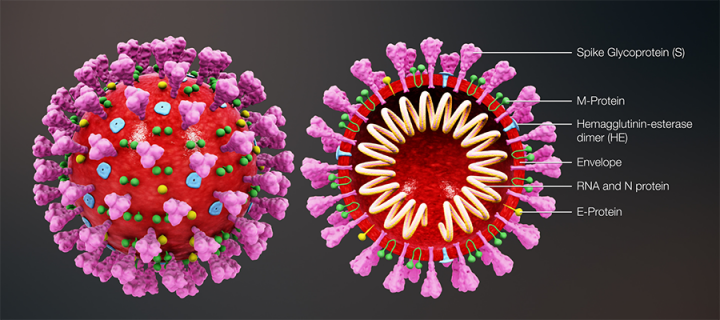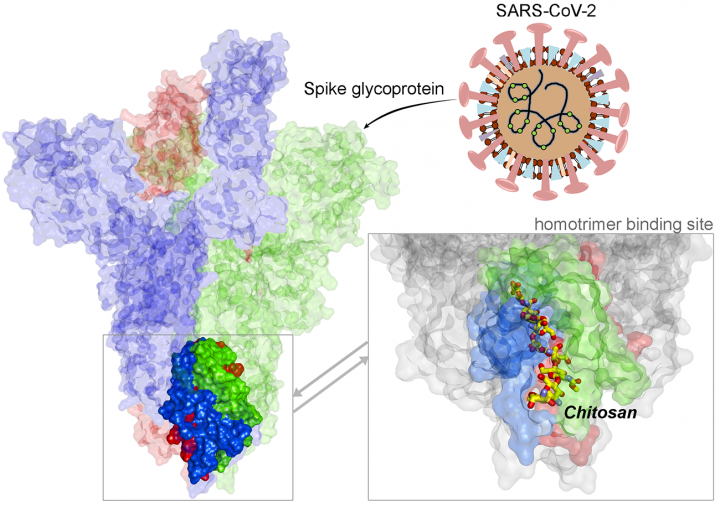Identification of a novel binding site on a SARS-CoV-2 spike glycoprotein
Researchers from the Edinburgh Cancer Research Centre and the International Centre for Cancer Vaccine Science identified a novel small molecule binding-site on spike protein of SARS-CoV-2, the virus behind the Covid-19: May 2020

Coronavirus disease 2019 (Covid-19) is an infectious disease caused by severe acute respiratory syndrome coronavirus 2 (SARS-CoV-2). The 2019-2020 coronavirus outbreak, declared a pandemic by the World Health Organisation on 11 March 2020, caused multiple deaths and changed the way we live and work. There is a huge ongoing international effort to contain the disease and to find effective medications. Many of the Cancer Research UK Edinburgh Centre clinicians and scientists are on the front line of the Covid-19-related developments by helping patients in hospital words, performing diagnostic testing, providing advice to policy makers and doing valuable research that could speed up development of effective vaccines and therapeutics.
A recent example of Covid-19-centred research contribution from our investigators is a study titled “Highly conserved homotrimer cavity formed by the SARS-CoV-2 spike glycoprotein: a novel binding site”, which has been published in the Journal of Clinical Medicine. This collaborative work has emerged from the International Centre for Cancer Vaccine Science (https://iccvs.ug.edu.pl), a joint research unit developed between the University of Gdansk in Poland and the University of Edinburgh with European Union Regional Development Funding. The SARS-CoV-2 spike protein plays an important role in the life cycle of the virus by binding to angiotensin converting enzyme-2 (ACE2) receptor on host cells facilitating entry into the host cell. The team measured spike protein variability derived from 791 viral genomes and studied its properties by molecular dynamics simulation. The molecular docking data revealed a previously unidentified cavity formed by trimerization of the Spike protein that could accommodate macrolide antibiotics such as Rapamycin. The finding of a novel “druggable” site on the spike protein will assist in future drug discovery programs aimed at targeting the coronavirus (CoV) family of viruses using macrocyclic immunomodulatory compounds. This collaboration reinforces the high value that the University of Edinburgh places on working with our European Union colleagues and emphasizes the need to develop ever stronger international research ties to tackle emerging global health problems. The study was led by Dr Umesh Kalathiya, Dr Javier Antonio Alfaro, and Professor Ted Hupp. It was supported by the University of Edinburgh, University of Gdansk, International Centre for Vaccine Science and the European Union Regional Development Fund.

Related Links
- Article in the Journal of Clinical Medicine: https://www.mdpi.com/2077-0383/9/5/1473
- Covid-19 homepage (gov.uk): https://www.gov.uk/coronavirus
- Covid-19 homepage (nhs.uk): https://www.nhs.uk/conditions/coronavirus-covid-19/
- Professor Ted Hupp Group website: https://www.ed.ac.uk/cancer-centre/research/hupp-group
- Professor Kathryn Ball Group website: https://www.ed.ac.uk/cancer-centre/research/ball-group
- Professor Neil Carragher Group website: https://www.ed.ac.uk/cancer-centre/research/carragher-group
Related Stories
- IGMM to support NHS by testing Covid-19 samples: https://www.ed.ac.uk/cancer-centre/news-and-events/news-2020/igmm-to-support-nhs-by-testing-covid-19-samples
- Clinical Fellow Acts as Scotland Lead for UK Coronavirus Cancer Monitoring Programme: https://www.ed.ac.uk/cancer-centre/news-and-events/news-2020/fellow-scotland-coronavirus-cancer-programme

